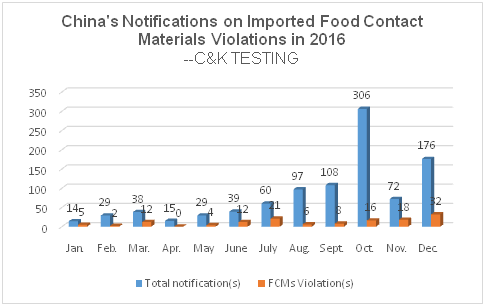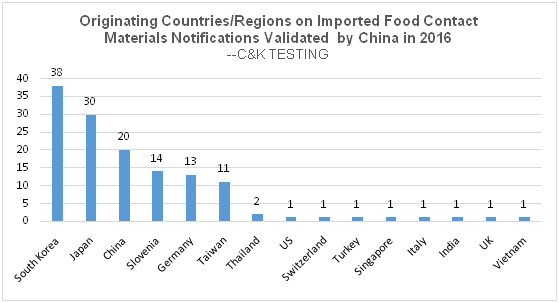Several mandatory national standards (GB standards) on food contact materials (FCMs) and articles in China will apply from 19 April 2017. The new China FCMs regulatory framework covers requirements throughout raw materials, manufacture management and testing. The wide coverage and great changes in relevant standards make it challenging for both Chinese operators and importers for China regulatory compliance.
Up to November 2016, NHFPC had issued two general standards GB 4806.1 for general safety requirements and GB 9685 for the use of additives, and 11 product standards.
Here is our summary on standards and implementation dates
Standard | Implementation Date |
General Standards: | |
GB 4806.1 for general safety requirements GB 9685 for the use of additives | 19 Oct. 2017 |
Product Standards: | |
GB 4806.2 Rubber nipples GB 4806.3-11 enamel articles, ceramics, glass articles, plastic resins, plastic articles, paper and paper board, metal, coatings, rubber GB 14934 disinfection tableware | 22 Sept. 2016 for rubber nipples 19 Apr. 2017 for other standards |
Comparison between old and new FCMs standards in China
Hygienic requirements
The new FCMs standards further categorise food contact materials/articles into 10 categories. That means different requirements shall be met for monomers, initiator and additives when fulfilling general requirements for raw materials, sensory, physic-chemical properties and labelling.
E.g. The standard GB 4806.7 for plastic materials and articles supersedes GB 9681-1988 (products of polyvinyl chloride for food packaging), GB 9687-1988 (polyethylene products) and GB 9688-1988 (polypropylene products). The new standard specifies uniform requirements on sensory, overall migration, consumption of potassium hypermanganate, heavy metals (calculated as Lead metal [Pb]), decoloration tests. But different plastics shall also conform to specific requirements for monomers, initiator and additives.
The scope of China FCMs regulation has overall expanded, such as metal materials (except to stainless steel and aluminum products) and coatings. Meanwhile, the requirements for bamboo, wood, adhesives, composite materials, inks, lubricants, textile fires are still under development.
Testing indexes
The new standard requires products tested as per actual conditions of use detailing selections of food simulants, test temperatures and test durations. The new test methods reasonably reflect product safety under normal use. C&K Testing advises businesses should communicate relevant information throughout the supply chain. That means more focus on raw material and formulation as well as downstream users, such as applicable audience, anticipated contact.
Market Surveillance on Imported Food Contact Materials and Articles
Food contact materials stay on top of market surveillance due to great hazards arising from. Throughout 2016 several lots of food contact materials or articles fail to comply with Chinese standards according to Quarantine and Inspection Authorities at entry ports in China. The notifications on imported food contact materials and articles are as below:
1. Notification analysis
In 2016, General Administration of Quality Supervision, Inspection and Quarantine of the People's Republic of China (AQSIQ) validated 983 lots of imported products, of which food contact materials account for 13.6%.

2. Analysis of originating countries/regions
The notifications validated in 2016 mainly cover 15 countries and regions. South Korea and Japan are most frequently notified. Some products were manufactured in China exported to foreign countries and then imported to China for sale again. 20 lots of such products were detected to violate against relevant standards.
3. Analysis of violations
The top reasons for violations are migration of heavy metals, evaporation residues and acylonitrile monomers. See the figure below for more details:

The new China FCMs regulatory framework makes it harder on regulatory compliance. C&K Testing advises businesses should learn about new requirements and have products tested as per new standards.
Accredited by CMA and CNAS, C&K Testing is at your service to render you on-stop solutions to new China FCMs regulatory compliance.
|Further information:
2016 Analysis of Chinese food contact articles notified on the EU market
Violation of food contact materials in 2016 national inspection of China
Guideline on DoC for Chinese food contact plastic materials seeks for opinions
|Our Services: Food Contact Materials
